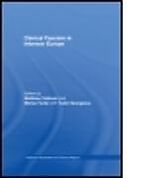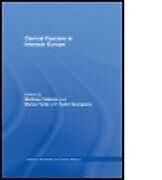Clerical Fascism in Interwar Europe
Einband:
Fester Einband
EAN:
9780415448246
Untertitel:
Englisch
Genre:
Geschichte
Autor:
Matthew Turda, Marius (Oxford Brookes Uni Feldman
Herausgeber:
Routledge
Auflage:
1. Auflage
Anzahl Seiten:
264
Erscheinungsdatum:
24.05.2008
ISBN:
978-0-415-44824-6
Informationen zum Autor Matthew Feldman is a Lecturer in Twentieth Century History at the University of Northampton and editor of the journal Totalitarian Movements and Political Religions. Klappentext This edited volume arose from an international workshop convened in 2006 by Feldman and Turda with Tudor Georgescu, supported by Routledge, and the universities of Oxford, Brookes, Northampton and CEU (Budapest). As the field of fascist studies continues to integrate more fully into pan-European studies of the twentieth century, and given the increasing importance of secular 'political religion' as a taxonomic tool for understanding such revolutionary movements, this collection of essays considers the intersection between institutional Christian faiths, theology and congregations on the one hand, and fascist ideology on the other.In light of recent debates concerning the intersecting secularisation of religion and (usually Christian-based) the sacralisation of politics, "Clerical Fascism" in Interwar Europe approaches such conundrums from an alternative perspective: How, in Europe between the wars, did Christian clergy, laity and institutions respond to the rise of national fascist movements? In doing so, this volume provides case studies from the vast majority of European countries with analyses that are both original in intent and comprehensive in scope. In dealing with the relationship of various interwar fascist movements and their respective national religious institutions, this edited collection promises to significantly contribute to relevant academic historiographies; and as such, will appeal to a wide readership.This book was previously published as a special issue of Totalitarian Movements and Political Religions. Zusammenfassung This edited volume arose from an international workshop convened in 2006 by Feldman and Turda with Tudor Georgescu, supported by Routledge, and the universities of Oxford, Brookes, Northampton and CEU (Budapest). As the field of fascist studies continues to integrate more fully into pan-European studies of the twentieth century, and given the increasing importance of secular 'political religion' as a taxonomic tool for understanding such revolutionary movements, this collection of essays considers the intersection between institutional Christian faiths, theology and congregations on the one hand, and fascist ideology on the other. In light of recent debates concerning the intersecting secularisation of religion and (usually Christian-based) the sacralisation of politics, "Clerical Fascism" in Interwar Europe approaches such conundrums from an alternative perspective: How, in Europe between the wars, did Christian clergy, laity and institutions respond to the rise of national fascist movements? In doing so, this volume provides case studies from the vast majority of European countries with analyses that are both original in intent and comprehensive in scope. In dealing with the relationship of various interwar fascist movements and their respective national religious institutions, this edited collection promises to significantly contribute to relevant academic historiographies; and as such, will appeal to a wide readership. This book was previously published as a special issue of Totalitarian Movements and Political Religions . Inhaltsverzeichnis Chapter 1 The 'Holy Storm', Roger Griffin; Part 1 Orthodox/Greek-Orthodox Christianity and Fascism; Chapter 2 Fascism and Religion, Aristotle A. Kallis; Chapter 3 Between 'Clerical Fascism' and Political Orthodoxy, Maria Falina; Chapter 4 Sacralised Politics in Action, Valentin S?ndulescu; Chapter 5 By Cross and Sword, Anton Shekhovtsov; Part 2 Protestant Christianity and Fascism; Chapter 6 'On the Side of Christ', Thomas Linehan; Chapter 7 Completing the Lutheran Reformation, Lena Berggren; Chapter 8 The Nazis' 'Positive Christianity', Richard Steigmann-Gall; Part 3 Catholic Christ...
Autorentext
Matthew Feldman is a Lecturer in Twentieth Century History at the University of Northampton and editor of the journal Totalitarian Movements and Political Religions.
Klappentext
This edited volume arose from an international workshop convened in 2006 by Feldman and Turda with Tudor Georgescu, supported by Routledge, and the universities of Oxford, Brookes, Northampton and CEU (Budapest). As the field of fascist studies continues to integrate more fully into pan-European studies of the twentieth century, and given the increasing importance of secular 'political religion' as a taxonomic tool for understanding such revolutionary movements, this collection of essays considers the intersection between institutional Christian faiths, theology and congregations on the one hand, and fascist ideology on the other. In light of recent debates concerning the intersecting secularisation of religion and (usually Christian-based) the sacralisation of politics, "Clerical Fascism" in Interwar Europe approaches such conundrums from an alternative perspective: How, in Europe between the wars, did Christian clergy, laity and institutions respond to the rise of national fascist movements? In doing so, this volume provides case studies from the vast majority of European countries with analyses that are both original in intent and comprehensive in scope. In dealing with the relationship of various interwar fascist movements and their respective national religious institutions, this edited collection promises to significantly contribute to relevant academic historiographies; and as such, will appeal to a wide readership. This book was previously published as a special issue of Totalitarian Movements and Political Religions.
Inhalt
Chapter 1 The 'Holy Storm', Roger Griffin; Part 1 Orthodox/Greek-Orthodox Christianity and Fascism; Chapter 2 Fascism and Religion, Aristotle A. Kallis; Chapter 3 Between 'Clerical Fascism' and Political Orthodoxy, Maria Falina; Chapter 4 Sacralised Politics in Action, Valentin S?ndulescu; Chapter 5 By Cross and Sword, Anton Shekhovtsov; Part 2 Protestant Christianity and Fascism; Chapter 6 'On the Side of Christ', Thomas Linehan; Chapter 7 Completing the Lutheran Reformation, Lena Berggren; Chapter 8 The Nazis' 'Positive Christianity', Richard Steigmann-Gall; Part 3 Catholic Christianity and Fascism; Chapter 9 Catholic Modernities in Fascist Italy, Jorge Dagnino; Chapter 10 Catholicism and Fascism in Belgium, Bruno De Wever; Chapter 11 Political Catholicism, Crisis of Democracy and Salazar's New State in Portugal, António Costa Pinto, Maria Inácia Rezola; Chapter 12 Enacting Encyclicals? Cultural Politics and 'Clerical Fascism' in Austria, 19331938, Robert Pyrah; Chapter 13 Radical Catholicism and Fascism in Croatia, 19181945, Mark Biondich; Chapter 14 Catholicising Fascism, Fascistising Catholicism? The Blueshirts and the Jesuits in 1930s Ireland, Mike Cronin; Chapter 15 'Do not Lead us into (Fascist) Temptation', Béla Bodó; conclusion 'Clerical Fascism', John Pollard;

Leider konnten wir für diesen Artikel keine Preise ermitteln ...
billigbuch.ch sucht jetzt für Sie die besten Angebote ...
Die aktuellen Verkaufspreise von 6 Onlineshops werden in Realtime abgefragt.
Sie können das gewünschte Produkt anschliessend direkt beim Anbieter Ihrer Wahl bestellen.
Loading...
Die aktuellen Verkaufspreise von 6 Onlineshops werden in Realtime abgefragt.
Sie können das gewünschte Produkt anschliessend direkt beim Anbieter Ihrer Wahl bestellen.
| # | Onlineshop | Preis CHF | Versand CHF | Total CHF | ||
|---|---|---|---|---|---|---|
| 1 | Seller | 0.00 | 0.00 | 0.00 |
